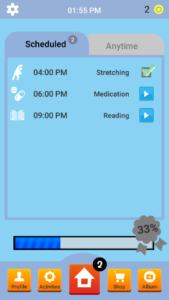
Purpose
The purpose of this research study is to test the use of a smartphone app to improve goal-directed behavior in individuals who have difficulty starting and completing daily activities.
Eligibility
- Diagnosis of mild behavioral variant frontotemporal dementia or Alzheimer’s disease or mild cognitive impairment
- Patient must have a care partner who has regular contact with the patient and can provide information to the research staff about the patient’s functioning
- Care partner must be able to accompany the patient to study visits for the duration of the study
- Patient and care partner must be willing to use a smartphone
* Patients with unmanaged depression are ineligible
Procedure
- Participants will be provided with a watch that monitors daily movement (worn by the patient) and a smartphone, which will be used by both the patient and care partner.
- Patients will take some tests of memory and thinking. The patient and care partner will answer questionnaires about their emotions, daily activities, personal goals and their experience using the app.
- There will be 4 visits over 4-6 weeks.
Compensation
- A patient and care partner pair can receive up to $140.
Principal Investigators
Lauren Massimo, PhD, CRNP and Dawn Mechanic-Hamilton, PhD, ABPP/CN
Contact
The contact for this study is coordinator Sean Lydon at (215) 349-8857 or slydon@pennmedicine.upenn.edu
News Articles:
The ActiviDaily App: Turning Apathy in to Action in Persons with Dementia

Principal Investigators Dawn Mechanic-Hamilton, PhD, and Lauren Massimo, PhD, CRNP, research coordinator Sean Lydon, and app developers Alex Miller, MS, and Dan Schiffrin created a smartphone application called ActiviDaily to help individuals with cognitive impairment who have difficulty planning, starting and completing their daily activities.
The app includes features for selecting individualized goals such as physical activity, cognitive stimulation, and engaging in hobbies. Alerting mechanisms are programed to help initiate behaviors to attain goals. Calendars and checklists simplify the activities in a step-by-step fashion, and rewards such as music or games are used to motivate the individual to attain their activity goals.
“The main thing we’re hoping to get out of the app is to improve quality of life for patients by getting them more involved in activities,” said Lydon.
The image to the right shows the home screen of the app, which displays participants’ schedule for the day. In this example, the participant has three tasks on their schedule: stretching, taking medication, and reading; and, thus far, the participant has marked stretching as complete. As the participant completes their daily tasks, bar towards the bottom of the screen fills up, providing more incentive to perform the tasks that remain.
Researchers also hope that by providing more structure to the day and alerting participants to complete tasks, ActiviDaily will reduce the burden of their care partners. A care partner of one participant said, “I’m excited by how much [the participant] was able to complete without me.” Another care partner said, “less nagging for me… he [the participant] did it for the app.”
The GDB App Study team has presented the study data at International Neuropsychological Society and the Gerontological Society of America meetings in 2020 and are excited to continue to make improvements to ActiviDaily this year.
*Enrollment for this study is currently closed.
